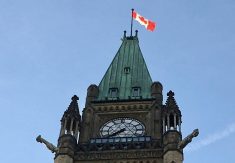A Senate committee is recommending that Canada drop its 28-year ban on the importation of bees from the United States.
In a report on bee health released this afternoon, the Senate committee on agriculture and forestry agreed with beekeepers in Manitoba and Alberta, who have lobbied the federal government to remove the restrictions on bee packages from the U.S., first imposed in 1987.
“Health Canada and the Canadian Food Inspection Agency amend the Honeybee Importation Prohibition Regulations, 2004, in order to allow the importation of bee packages from the United States while developing additional methods and tools to improve the inspection of imported honeybee packages,” the committee said in its report, The Importance of Bee Health to Sustainable Food Production in Canada.
Read Also

U.S. corn and soybean yields revised down by USDA
Soybean and corn yields in the United States were revised downward from earlier estimates in updated supply/demand tables from the United States Department of Agriculture released Nov. 14.
The federal government introduced the ban on U.S. bees to protect Canadian beekeepers from parasites like varroa mites and bee diseases.
The Manitoba Beekeeper Association has argued for several years that the U.S. import ban should be lifted because Canadian beekeepers need access to bees in years with high winter losses so that they can quickly rebuild their colonies.
“When our bees die off, it takes two to three or sometimes five years to build back up,” said Bryan Ash, a beekeeper from Gilbert Plains, Man. “Every time you’re building up you’re losing honey production.”
In 2013, the CFIA decided it was too risky to import bee packages from the U.S. because “there is still a high probability of introducing diseases and pests into Canada.”
Beekeepers do import bee packages, a queen and two or three pounds of worker bees, from Chile and New Zealand, but the cost can be prohibitive.
Julie White, a member of the Ontario Beekeepers’ Association who participated in a press teleconference for the release of the Senate report, was surprised by the committee’s recommendation.
“Ontario beekeepers, Quebec beekeepers and B.C. beekeepers have also stated a concern about importation of bees from the U.S.,” she said. “Could you explain why you would want to overturn this concern about colony collapse disorder … or Africanized bees, or small hive beetle, all of which are a threat related to the importation of bees from the U.S.”
Claudette Tardif, ag and forestry committee deputy chair, said beekeepers from the Prairies and apiarists in the Maritimes wanted the import restriction removed.
“In Canada, there is a strong demand for bees that cannot be met locally,” she said. “We depend on bees that we get from Australia and New Zealand…. With the high mortality that we have, we need to increase the (amount of) bees we can get.”
The ag and forestry committee did make a couple of minor recommendations regarding neonicotinoid insecticides, which have been linked to bee colony losses in North America and Europe.
The report said the Pest Management Regulatory Agency should speed up its re-evaluation of neonicotinoids and should accelerate its registration process to reduce the number of conditional registrations for the class of insecticides.
However, the committee didn’t blame neonics for higher rates of bee deaths and bee colony losses in parts of Canada, particularly Ontario.
“Witnesses identified a number of stressors that may explain these losses, namely weather and climate change, transportation of bees, diseases and parasites, disease and parasite treatments, a lack of floral diversity and neonicotinoid pesticides,” the report stated. “These factors likely interact and combine to cause the high levels of bee mortality.”
Contact robert.arnason@producer.com















